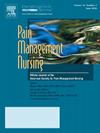影响老年慢性疼痛患者自我管理阶段的因素:一项横断面研究。
IF 1.6
4区 医学
Q2 NURSING
引用次数: 0
摘要
目的:调查老年慢性疼痛患者自我管理阶段的现状及相关影响因素:方法:横断面研究:方法:选取 2022 年 12 月至 2023 年 6 月五城区共 326 名老年慢性疼痛患者作为研究对象。我们使用一般信息调查表、数字评分量表、疼痛变化阶段问卷、慢性疼痛患者健康素养评估工具和疼痛心理不灵活量表收集参与者的相关信息。通过单变量分析和多元序数逻辑回归分析来确定自我管理阶段的相关影响因素:老年慢性疼痛患者的自我管理阶段如下:前考虑阶段(52 人;16.0%)、考虑阶段(103 人;31.6%)、行动阶段(62 人;19.0%)和维持阶段(109 人;33.4%)。回归结果显示,家庭月平均收入、吸烟史、疼痛持续时间、健康知识和心理不灵活是老年慢性疼痛患者自我管理阶段的影响因素:本研究发现,老年慢性疼痛患者的自我管理阶段仍有待提高。临床意义:临床意义:护理专业人员可利用研究调查结果识别自我管理阶段水平较低的患者,并根据各种影响因素制定个性化干预策略。例如,护士可以提供实用的戒烟指导,帮助老年慢性疼痛患者改善生活方式。如果经济条件允许,护士还可以寻求家庭成员的支持,共同为患者提供更好的医疗和护理服务。其次,正如我们的研究所示,患者的健康知识水平和心理弹性较差。护士可以利用现有的临床资源提供教育材料,如便携式手册和在线视频,内容包括疼痛相关知识、止痛药物的管理以及按摩和运动等应对策略。将这种方法与放松疗法等心理健康教育相结合,可以帮助患者更好地了解自己的疼痛,并积极参与自我管理。此外,护理人员应多关注老年慢性疼痛患者的自我管理阶段,可将自我管理阶段的评估纳入患者的临床疼痛管理中。定期评估有助于追踪更多需要关注的患者,及时调整疼痛管理方案。本文章由计算机程序翻译,如有差异,请以英文原文为准。
Factors Influencing the Self-Management Stages of Older Patients With Chronic Pain: A Cross-Sectional Study
Purpose
To investigate the current status and related influencing factors of self-management stages in older patients with chronic pain.
Design
A cross-sectional study.
Methods
A total of 326 older patients with chronic pain were selected as the study subjects in five city districts from December 2022 to June 2023. We used a general information survey form, a numerical rating scale, a pain stages of change questionnaire, a health literacy assessment instrument for patients with chronic pain, and a psychological inflexibility in pain scale to collect relevant information from participants. Univariate analysis and multiple ordinal logistic regression analysis were conducted to identify the relevant influencing factors of the self-management stages.
Results
The self-management stages of older patients with chronic pain were as follows: precontemplation stage (n = 52; 16.0%), contemplation stage (n = 103; 31.6%), action stage (n = 62; 19.0%), and maintenance stage (n = 109; 33.4%). Regression results showed that average monthly household income, smoking history, pain duration, health literacy, and psychological inflexibility were the influencing factors for the self-management stages of older patients with chronic pain.
Conclusions
In this study, the self-management stages of older patients with chronic pain still needed to be improved. Suitable personalized pain self-management strategies should be developed based on identified factors affecting patients to improve their self-management stages.
Clinical Implications
Nursing professionals can use research survey findings to identify patients at low levels of self-management stage and develop personalized intervention strategies based on various influencing factors. For example, nurses can provide practical smoking cessation guidance to assist older chronic pain patients in improving their lifestyle. Nurses can also seek support from family members to collectively offer better medical care and nursing services for the patient if financially feasible. Secondly, as our study has demonstrated, patients' health literacy and psychological flexibility were poor. Nurses can utilize available clinical resources to offer educational materials, such as portable handbooks and online videos, covering pain-related knowledge, managing pain medication, and coping strategies like massage and exercise. Combining this approach with mental health education, such as relaxation therapy, can help patients better understand their pain and actively participate in their self-management. In addition, nursing staff should pay more attention to the self-management stages of older chronic pain patients, and the assessment of self-management stages can be included in clinical pain management for patients. Regular assessment will help track more patients needing attention and make timely adjustments to their pain management plans.
求助全文
通过发布文献求助,成功后即可免费获取论文全文。
去求助
来源期刊

Pain Management Nursing
医学-护理
CiteScore
3.00
自引率
5.90%
发文量
187
审稿时长
>12 weeks
期刊介绍:
This peer-reviewed journal offers a unique focus on the realm of pain management as it applies to nursing. Original and review articles from experts in the field offer key insights in the areas of clinical practice, advocacy, education, administration, and research. Additional features include practice guidelines and pharmacology updates.
 求助内容:
求助内容: 应助结果提醒方式:
应助结果提醒方式:


